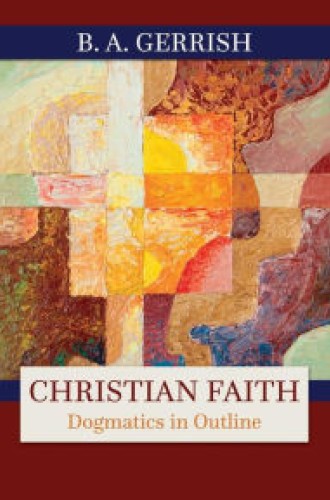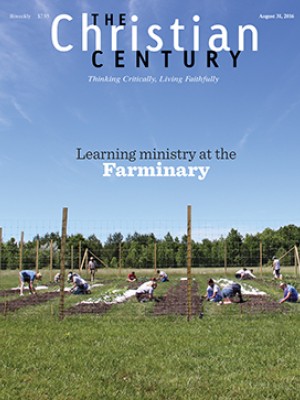Redemption revisited
Faith is formed in us by the Spirit and the life of the church. It renews our elemental confidence and creates our disposition toward the world.
Brian Gerrish, who for many years taught theology at the University of Chicago Divinity School, has written an exquisite intellectual and Christian adventure that draws on a lifetime of scholarship. Gerrish understands the subject of Christian dogmatics to be Christian faith, a “filial trust in God the Father of Jesus Christ” that confirms an elemental and general human confidence in the meaning of the world and our existence in it. This conception of faith, alongside Gerrish’s readings of Calvin and Schleiermacher on religion and arguments made by Schubert M. Ogden, forms a vibrant Reformed theology.
Sin is an estrangement from God and the order of God’s world based in our loss of elemental faith. As sinners, then, we are gripped by a fundamental loss of confidence and an accompanying anxiety. Rather than glorify God we become occupied with securing our own meaning and worth, a posture that sets us at odds with the order of the world and brings with it a train of bad consequences. The gospel addresses our predicament. In Christ, who discloses authentic humanity as well as the design of the Creator, we are reconciled to God and adopted as God’s children. Christ’s work is the gift of a saving faith that is formed in us by the Spirit and the corporate life of the church, renews our elemental confidence, and founds an appropriate disposition toward the world. In addition, through Spirit and church we receive from Christ the will for the kingdom.
Read our latest issue or browse back issues.
A “dogmatics in outline,” Gerrish’s book does not present “full and definitive arguments” but aims to open up reflection and conversation. Rather than offering an exhaustive historical survey, it draws on Calvin and Schleiermacher as benchmarks, supplemented by appropriate references to an ecumenical variety of classical and recent thinkers and followed by constructive remarks. While Gerrish’s theology is clearly a reflective enterprise, its deep subject remains existential and practical rather than merely intellectual. The focus is on the relationship between creation (the doctrine of elemental and theistic confidence presupposed by redemption) and redemption (“the proper doctrine of Christian faith”). Indeed, like Schleiermacher, Gerrish includes a nonspeculative discussion of the Trinity that arrives at no final doctrine and questions whether internal relations between Father, Son, and Spirit are really required by faith’s experience. His closing reflections on eternal life as a present quality and the possibility of personal survival remain centered not on us but on God’s glory.
In my evaluation Gerrish’s understanding of dogmatics is too narrow. He maintains that the Redeemer is the Christ of faith rather than the Jesus of history, and that the dogmatic task is to review New Testament data and Christian tradition to arrive at a theological picture that will kindle in us the same faith that animated the first believers. But he largely sidesteps the question of whether and how Jesus research enhances our theological interpretations (as it appears to do when, in discussing papal primacy, Gerrish notes that Matthew 16:18 may not be an authentic saying of Jesus). Indeed, recent historical studies have intensified our understanding of Jesus’ message of the kingdom as a reality with significant social and political dimensions. This insight, in turn, supports views of reconciliation and redemption that make it difficult to distinguish dogmatics from Christian ethics as thoroughly as Gerrish prefers.
Because of this deep distinction between dogmatics and ethics, Garrish says comparatively little about how theology may interpret ideas of recent evolutionary anthropologists concerning human capabilities, morality, and our kinship with other animals. And his concern for a lost connection between Eucharist and table fellowship might be strengthened by John Dominic Crossan’s contention that the practice of eating randomly with everyone (including the morally questionable and the poor) embodies Jesus’ message of an alternative kingdom. Gerrish has methodological reasons to separate such considerations from dogmatics as it aims to comprehend Christian beliefs. But as they try to understand what they believe, many Christians do not.
This critique notwithstanding, Gerrish’s book is a work of genuine significance for theology and the church. Some years ago, systematic theology—the kind that takes account of how varied elements of Christian believing hang together and inform a distinctive way of living—seemed dead. Theology professors adapted, no longer building introductory classes around texts by Barth, Brunner, and Tillich, but instead piecing together syllabi with less comprehensive and rigorous books supplemented by articles and excerpts. As a result, many seminary graduates today—even those comparatively more interested in theology—receive no significant exposure to a serious contemporary systematic project. The consequences for ministry have been harmful, especially when it comes to the perennial challenge of connecting Christian piety and tradition with the lives of present-day people and communities.
Gerrish’s Christian dogmatics is part of a recent unexpected boomlet of substantial systematic theologies written in North America. (Another example is Katherine Sonderegger’s Systematic Theology: The Doctrine of God.) If seminary professors will adapt once again, Gerrish’s book will advance the theological acuity of Protestant ministers.







